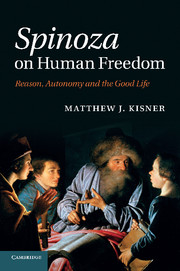Book contents
- Frontmatter
- Contents
- Abbreviations and translations
- Acknowledgments
- Introduction: Beyond therapy
- 1 Freedom as rationality
- 2 Justifying Spinoza's conception of freedom
- 3 Autonomy and responsibility
- 4 Freedom and happiness
- 5 The good
- 6 The natural law
- 7 Benevolence
- 8 The free man
- 9 Rational deliberation
- 10 The character of freedom
- 11 The freedom of the citizen
- Conclusion: “The true freedom of man”
- Bibliography
- Index
2 - Justifying Spinoza's conception of freedom
Published online by Cambridge University Press: 01 March 2011
- Frontmatter
- Contents
- Abbreviations and translations
- Acknowledgments
- Introduction: Beyond therapy
- 1 Freedom as rationality
- 2 Justifying Spinoza's conception of freedom
- 3 Autonomy and responsibility
- 4 Freedom and happiness
- 5 The good
- 6 The natural law
- 7 Benevolence
- 8 The free man
- 9 Rational deliberation
- 10 The character of freedom
- 11 The freedom of the citizen
- Conclusion: “The true freedom of man”
- Bibliography
- Index
Summary
The fact that Spinoza offers his conception of freedom in a definition at the beginning of the Ethics might give the impression that he simply stipulates this conception without defense or justification. In this case, Spinoza would have little to say to the many readers, then and now, with competing views and intuitions. However, Spinoza does offer arguments to back up his definition, though they tend to be tucked away in letters and scholia rather than featured in the demonstrations of the Ethics. This chapter examines these arguments, with somewhat surprising results. Since he is a causal determinist, one might suppose that Spinoza is forced to conceive of freedom as self-determination because it is the only conception available to him, having ruled out a more robust conception of freedom as the ability to do otherwise. According to this suggestion, the ultimate justification for Spinoza's view of freedom is his arguments for causal determinism and, thus, the metaphysics from Part i of the Ethics. This chapter shows, however, that Spinoza's arguments seldom presuppose the truth of causal determinism; rather, they target the more fundamental incompatibilist intuitions that freedom requires some form of causal independence. Consequently, he does not regard his freedom as second-best and, moreover, he has something to say to those who think it is.
The first two sections consider his arguments against each of two versions of the libertarian conception of freedom as the ability to do otherwise.
- Type
- Chapter
- Information
- Spinoza on Human FreedomReason, Autonomy and the Good Life, pp. 46 - 56Publisher: Cambridge University PressPrint publication year: 2011



